|
What is the Suite Chidori Engine?
FORUM8 has released the Suite Chidori Engine, the redeveloped
product of the Japan-made Cross Platform Game Engine "Chidori" developed
by Premium Arts. This product is provided free of charge for personal
non-commercial uses including programming education for students.
The Chidori, the base of the Suite Chidori Engine, includes libraries
and tools that can be used for the development with Visual Studio. Users
can manage from the display of 3D models to the control of each event
easily by using the task system. The UI can be created and imported with
the special editor.
In addition to the existing features of the Chidori, the Suite Chidori
Engine corresponds to the newest Visual Studio and FBX import. This allows
users to develop with the Visual Studio Community which is provided for
students free of charge and import 3D models created with the
comprehensive 3D CG software Shade3D.
Features
In this series, we introduce features and case examples of the Suite Chidori
Engine. Here we talk about what we can do with the Suite Chidori Engine.
1. Task System
Games are controlled by the combination of tasks. Each task includes one
event such as "Displaying the title", "Pause", "Player's action", and
"Enemy's action". Tasks can be nested as shown in the Fig.1 and its
contents can be customized for a variety of game genres. The task system
simplifies game flows and management controls. In addition, the
development by task makes the division of development easy, and the
development speed is improved by using same tasks in several scenes and
games.
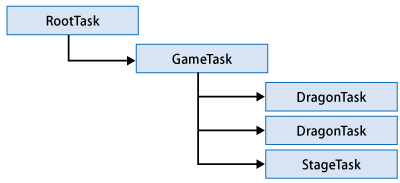 |
| Fig.1 Image of task (concept) |
Example of use: Model display by
menu selection
Tasks are created according to the selected menu, and models registered to
tasks can be displayed. In the Fig.2, "Stage" in the menu is pressed and
"StageTask" shown at the bottom of the Fig.1 is generated.
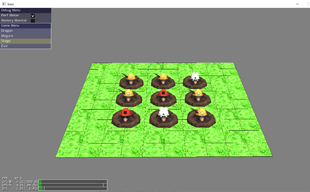 |
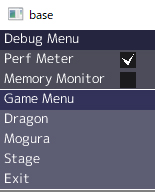 |
| Fig.2 Image of task (reflected on the actual
screen) |
Fig.3 Menu window |
2. Model display
The Suite Chidori Engine can handle FBX 3D models. This is the general 3D
model format and can be created and edited with most 3D creation software.
Position, rotation, size, and rendering of imported model can be edited
easily. As for texture, the Suite Chidori Engine supports the dds file
format that can be created, edited, and converted with compatible image
editor software. You can create texture by converting image files to the
dds format images on conversion websites even if you have no editor software.
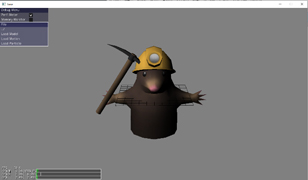 |
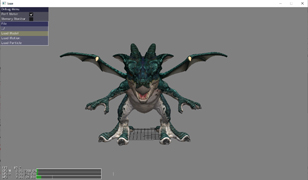 |
| Fig.4 Example of 3D model display (mole) |
Fig.5 Example of 3D model display (dragon) |
3. Animation
FBX animation files can also be handled in the Suite Chidori Engine. Imported animations work just by
attaching them to models. No special setting is required.
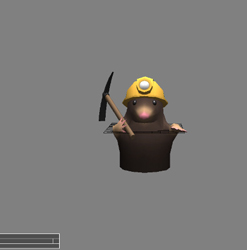 |
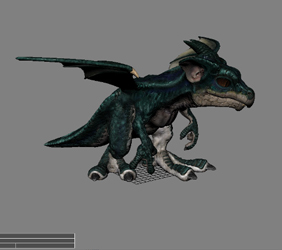 |
| Fig.6 Example of animation |
|
4. 2D graphic
You can draw planes and lines on the 3D space. Colors and transparency can
be changed, and camera images can also be drawn on the plane. Various
utilizations are depending on your ideas.
Example1: Semitransparent
Two semitransparent boards are placed. The mole model can be seen through
the red board.
Example 2: Camera image
The image is displayed on the red plane. The image looks distorted due to
the difference of aspect ratio between window and plane. The depth is
displayed on the white plane, and the silhouette of the black mole is
shown slightly.
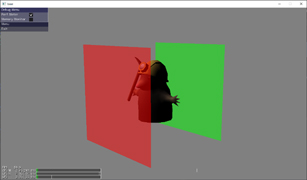 |
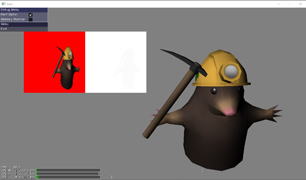 |
| Fig.7 Example of 2D graphic display
(semitransparent) |
Fig.8 Example of 2D graphic display (camera image) |
5. Lighting
The Suite Chidori Engine supports the following 3 lightings.
- Directional Light
- SpotLight
- AmbientLight
Directional Light is the light source illuminating all models from one
direction with the same strength like the sun.
The second light type is
SpotLight. This light source emits the light in a corn form from a single
point in space. By changing angle, it can be used as PointLight that
spreads light within a specified range. Please imagine the light of street
lights and lighting equipment.
The last one is AmbientLight. It reproduces the light scattered in space
and illuminates shadow areas where the light does not reach.
6. Camera
You can control the camera position and gazing point in the 3D space.
Cameras that can be operated with mouse and keyboard can also be used.
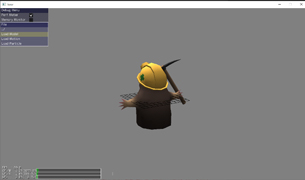 |
| Fig.9 Camera operation (mole model viewed from
behind) |
Other features
In addition to the functions above, you can use the following features.
The details of these functions will be introduced in future series.
- Model collision determination
- UI display
- Effect display by particle
- Post effect
- Sound playback
Future development
FORUM8
is planning to implement various expression technologies including the
physical base rendering to the Suite Chidori Engine and improve the engine
for the newest game hardware. We will also enrich tips and documents to help
users to understand unclear parts and provides more professional contents.
Moreover, we will release a lot of games made by using the Suite Chidori
Engine, hoping that it would be a reference for user's development and
give a joyful game time to users. Please keep your eyes on the future
development of the Suite Chidori Engine.
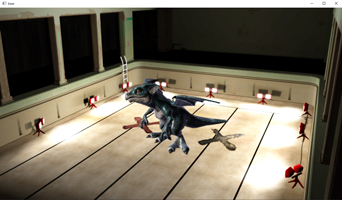 |
| Fig.10 Game contents using the Suite Chidori Engine |
|


